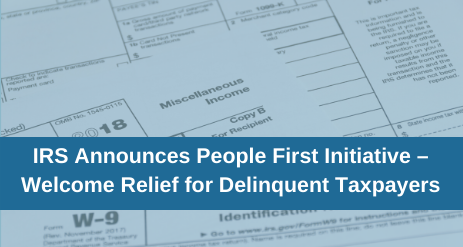
For taxpayers who are delinquent in their tax payments, the IRS is a feared institution. Through levies on bank accounts, payroll earnings and receivables, the IRS has powerful forced collection tools.
Recognizing that the COVID-19 crisis has pushed so many people into precarious and unexpected financial hardship, the IRS Commissioner announced on March 25 a new People First Initiative, which allows delinquent taxpayers a reprieve from April 1 through July 15 (Suspension Period) from a range of payment obligations. These include the following:
Forced Collection Action. Liens and levies (including any seizure of personal residences) will be suspended during the Suspension Period. IRS will not initiate any new liens or levies and field officers will not take any action to force payment of delinquent taxes.
New Audits. During the Suspension Period the IRS will not start any new audit examination, except in cases where expiration of the statute of limitations is imminent.
Pending Audits. Pending audits will be continued if feasible but without in-person meetings. Taxpayers will be afforded flexibility in responding to requests for information during the Suspension Period.
Installment Agreements. If a taxpayer is currently making periodic payments under an installment agreement, the taxpayer may suspend payments due during the Suspension Period. There is no requirement for the taxpayer to show that s/he has been adversely affected by the COVID-19 crisis.
New Installment Agreements. IRS reminds taxpayers of the availability of the installment agreement program under which a taxpayer with an unpaid tax liability may enter into an agreement to make monthly payments and avoid the risk of forced collection action. For those taxpayers who have been laid off or furloughed or otherwise suffered a loss of income, this may be a good time to request an installment agreement since expected income is a key factor in setting the monthly payment amount.
Offers in Compromise. For a taxpayer with a pending Offer in Compromise, the IRS has granted an extension until July 15 to provide any requested information. If a taxpayer is making installment payments under an accepted Offer in Compromise, s/he may suspend payments during the Suspension Period.
Refund Claims. The IRS will continue to work refund claims but without in-person contact.
Non-Filers. IRS estimates that more than one million households have not filed their tax returns for the last three years and that many of them may be owed refunds. These taxpayers are encouraged to file the delinquent returns, retaining tax professionals if needed. For taxpayers who earned less than $99,000 ($198,000 if filing a joint return), filling 2018 or 2019 tax returns has the benefit of enabling them to receive payments under the economic stimulus legislation expected to be passed by Congress today since the 2018 (or, if filed, 2019) returns will be used to identify the individuals eligible to receive payments. Payments will be up to $1,200 for taxpayers filing as single and $2,400 for joint returns, with an additional $500 per child.
Click here to see the full IRS Announcement.
For questions about this and other COVID-19 related tax developments, please contact Bob Canter or TJ Wilkinson at Shulman Rogers.
The contents of this Alert are for informational purposes only and do not constitute legal advice. If you have any questions about this Alert, please contact the Shulman Rogers attorney with whom you regularly work or a member of the Shulman Rogers Tax Group.
Stay up to date with all the latest news and events.